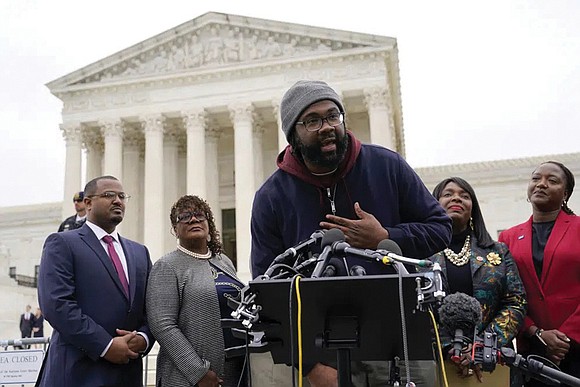High court diluted Voting Rights Act a decade ago, prompting wave of new voting rules
Christina A. Cassidy and Ayanna Alexander/The Associated Press | 6/8/2023, 6 p.m.

ATLANTA - Within hours of a U.S. Supreme Court decision dismantling a key provision of the Voting Rights Act, Texas lawmakers announced plans to implement a strict voter ID law that had been blocked by a federal court. Lawmakers in Alabama said they would press forward with a similar law that had been on hold. The ruling continues to reverberate across the country a decade later, as Republican-led states pass voting restrictions that, in several cases, would have been subject to federal review had the conservative-leaning court left the provision intact.
At the same time, the justices have continued to take other cases challenging elements of the landmark 1965 law that was born from the sometimes violent struggle for the right of Black Americans to cast ballots. The justices are expected to rule in the coming weeks in a new case out of Alabama that could make it much more difficult for minority groups to sue over gerrymandered political maps that dilute their representation.
“At that point, you have to ask yourself what’s left of the Voting Rights Act?” said Franita Tolson, a constitutional and election law expert and co-dean of the University of Southern California School of Law.
Core parts of the law have been reauthorized with bipartisan support five times since it was signed by then-President Lyndon Johnson, the most recent in 2006. But congressional efforts to address the enforcement gap created by the June 2013 Supreme Court decision on what was known as preclearance — federal review of proposed election-related changes before they could take effect — have languished amid increasingly partisan battles over the ballot box.
The recent wave of voting changes have been pushed by Republican lawmakers who point to concerns over elections that have been fueled by former President Trump’s false claims that the 2020 election was stolen.
At least 104 restrictive voting laws have passed in 33 mostly GOP-controlled states since the 2020 election, according to an analysis by the Voting Rights Lab, which tracks voting legislation in the states.
Alabama could add another to the list soon, one that would make it a crime to help a non-family member fill out or return an absentee ballot. While supporters argue the law is needed to boost security, critics say it could make it difficult for voters who are older, low-income, ill or who do not feel comfortable with the already cumbersome absentee ballot process, which includes a requirement to submit a copy of a photo ID.
“This is voter suppression at its best,” said Betty Shinn, a 72-year-old Black woman from Mobile who recently testified against the bill during a legislative hearing in Montgomery. “It’s no different from asking me how many jellybeans are in that jar or asking me to recite the Constitution from memory.”
It was such Jim Crow-era rules that the Voting Rights Act was designed to stop, relying on a formula to identify states, counties and towns with a history of imposing voting restrictions and with low voter registration or participation rates. They then were required to submit any proposed voting changes in advance, either to the U.S. Department of Justice or the federal court in Washington.
The law included ways for jurisdictions to exit the preclearance requirement after demonstrating specific improvements, and dozens had over the years.
At the time of the 2013 decision, nine states and a few dozen counties and towns in six other states were on the list for federal review. That included a small number of counties in California and New York.
In the decade since the Supreme Court decision, which came in a case filed by Shelby County, Alabama, lawmakers in the nine states formerly covered by the preclearance requirement have passed at least 77 voting-related laws, according to an analysis by the Voting Rights Lab for The Associated Press.
Most improved voter access and likely would have sailed through fed- eral review. But at least 14 laws – in Alabama, Arizona, Georgia, Louisiana, Mississippi, South Carolina, Texas and Virginia – added new voting restrictions, the Voting Rights Lab found. These include nine, high-profile bills passed in the aftermath of the 2020 election that would have almost certainly drawn significant scrutiny from the Justice Department.
In Georgia, Senate Bill 202 added ID requirements to mail voting, codified the use of ballot drop boxes in a way that reduced the number allowed in metro Atlanta — and restricted outside groups from providing water and food to voters standing in line. Republicans have said the changes were needed to boost security. Groups in the state have recalibrated their efforts to help voters.
Arizona passed two measures last year requiring voters who use state and federal voter registration forms to prove their citizenship and purging voters based on whether county election officials believe they might not be citizens or might not be qualified to vote.
Those could disproportionately affect Asian American, Native Hawaiian and Pacific Islander communities with cultural family names, said Alexa-Rio Osaki, political director of the Arizona Asian American Native Hawaiian and Pacific Islander for Equity Coalition.
“If Shelby v. Holder didn’t exist, we wouldn’t have to worry about feeling as if we’re excluded yet again,” she said. “So, we’re talking about targeting our own communities within the state just based on what our name is and whether that looks American or not.”
In North Carolina, voting rights groups are bracing for the return of the state’s strict voter ID law, which the new GOP majority on the state Supreme Court has revived. They say the law will disproportionately affect younger voters. Several North Carolina counties, home to a handful of historically Black colleges and universities, were previously subject to federal review.







